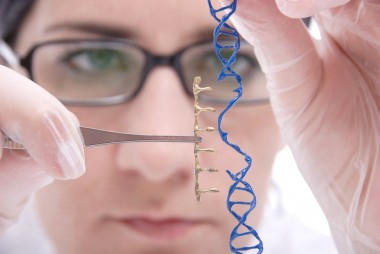Video Conferencing Helps Patients Access Genetic Counselling

June 2018
Genetic counselling for cancer patients has become the standard of care at academic medical centers across the United States. Patients cared for at community-based medical practices however, may not have access to these resources. According to a new study from the Basser Center for BRCA at the University of Pennsylvania’s Abramson Cancer Center, video and phone sessions can close that gap, allowing patients to receive these services who might not otherwise.
The study’s lead author is Angela R. Bradbury, MD, an assistant professor of Hematology-Oncology. Bradbury and her team randomly assigned 115 patients who were candidates for genetic testing into two groups – one that received a phone or video counseling session and one that were provided information on how they can get genetic testing. All participants were patients at primary care practices throughout Pennsylvania, New Jersey, Delaware, and Maryland.
Of the 71 patients in the group offered remote genetic counseling services, 55 of them (77 percent) went on to complete the counseling. Just two of 36 patients (six percent) in the usual care group completed genetic counseling. In addition, 55 percent of patients in the remote services arm proceeded to actual genetic testing, leading to the identification of four genetic carriers.
“The data definitively show the impact of remote genetic services, and it’s clear from this study that this telemedicine approach improves on what community practices can do on their own,” Bradbury said. “That said, it’s noteworthy that just 56 percent of patients who underwent remote counseling went on to undergo genetic testing. It shows we still have work to do to help equip patients with this information, which can be life-saving in some cases.”
Genes are coded messages that tell cells how to make proteins. Proteins are the molecules that control the way cells behave. Our genes decide what we look like and how our body works. Cancer cells are different from normal cells. They have changes (called faults or mutations) in several of their genes which make them divide too often and form a tumour. Many gene changes that make a cell become cancerous are caused by environmental or lifestyle factors. A small number of people have inherited faulty genes that increase their risk of particular types of cancer.
Gene therapy is a type of treatment which uses genes to treat illnesses. Researchers have been developing different types of gene therapy to treat cancer. The ideas for these new treatments have come about because we are beginning to understand how cancer cells are different from normal cells. Germline genetic testing, for example, helps doctors identify patients at increased risk for cancer who may benefit from additional or early screening or other cancer prevention interventions.
As genetic technologies rapidly develop, the need for genetic counselors expands. A genetic councilor will find themselves facilitating decision-making, reducing guilt, grief and bereavement, as well as maintaining an interest in clinical research, genomic technologies, and overall patient advocacy and education regarding genetic testing and results. Currently, only 37 percent of patients who undergo testing meet with a counselor beforehand.
To read the full article regarding the study, click the following link
